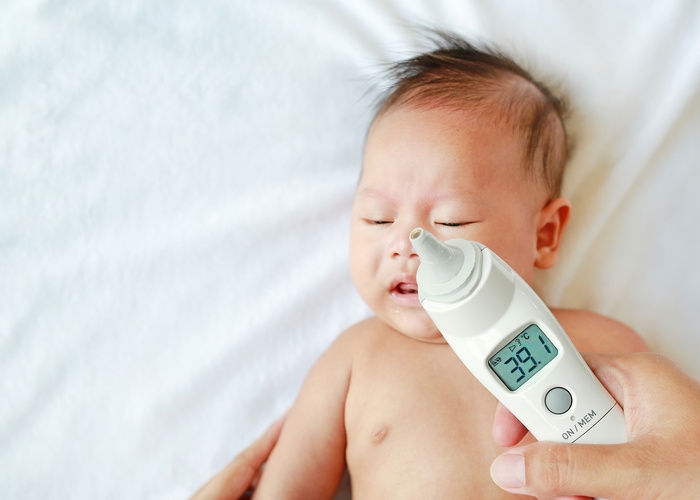At some point, most babies come down with a fever. Because of their acute symptoms, fevers can be confronting for parents to witness and can raise alarm bells. But what’s happening to your baby when a fever strikes? And are fevers cause for concern?
Please note that this article does not constitute medical advice – always consult with your doctor.
What is a fever?
Most babies’ body temperatures are between 36.5°C and 38°C, and the most common sign of fever is when their temperature rises above this range. Medical specialists believe this elevated temperature is your baby’s body fighting off an infection. So, rather than being an illness itself, a fever is better understood as a condition or a response to an infection or other illness.
What causes fever?
Fevers can be caused by infections ranging from the common cold to much more serious illnesses. Some of these infections, like colds or chickenpox, are viral. Others are bacterial in nature, such as ear, throat and urinary tract infections. If diagnosed, these can usually be treated with antibiotics.
What are the symptoms?
Fevers involve rises and falls in body temperature through the day – usually lower in the morning and higher in the evenings. Red skin, shivering, sweating, painful skin and dehydration can all occur, as well as lethargy, intense crying and even vomiting. If that occurs, seek immediate help from a doctor or emergency services.
Sometimes your baby might have fits, called febrile convulsions, and while these are confronting, they do not necessarily indicate a serious underlying illness. If these are occurring, however, you should speak to a doctor.
Most fevers last up to a few days, and during this time, you’ll see a noticeable peak and fall in symptom severity. Fevers that last longer can be a sign of an underlying condition, chronic illness or severe infection. These require immediate medical attention.
Care during fever
If you can’t treat the infection causing fever, you can help to soothe and comfort your baby.
- Always speak to a doctor or pharmacist about paracetamol or ibuprofen for babies. The safe age for taking different medications varies.
- Opt for smaller, more frequent feeds. Older babies can sometimes be given additional fluids like water or diluted fruit juice, but consult your GP before introducing liquids other than breastmilk or formula.
- Choose light clothing and bedding and keep your child in shaded areas of the house.
Monitoring during fever
You can monitor your baby’s body temperature using a few different at-home methods.
- Digital ear thermometers. These have been around for a long time and are easy to use. They give readings by being inserted shallowly into your baby’s ear canal.
- Digital probe thermometers. These can be positioned under the tongue or under the armpit of a baby and give accurate readings.
- Digital temporary artery thermometers. These scan your infant’s forehead and when used correctly give a very accurate reading.
Avoid old-fashioned mercury thermometers – if they break, they can lead to mercury poisoning.
When to seek medical advice
You should always seek medical advice if you have serious concerns about your baby’s health. However, the need can be even more pressing and require emergency care (call 000 if unsure) if your baby is experiencing fever symptoms and has or is:
- under three months old
- losing fluids through vomiting, persistent diarrhoea and refusal to drink
- persistently sleepy
- experiencing trouble breathing
- in constant pain when touched
- febrile convulsions
- a rash
- sensitivity to light
- experiencing fever symptoms for more than two days, or they are getting worse
- experiencing a temperature above 38°C.
Recommended Articles:
https://www.babybunting.com.au/baby-talk-blog/warning-signs-of-serious-conditions-in-newborn//
https://www.babybunting.com.au/baby-talk-blog/understanding-thrush-in-babies/



